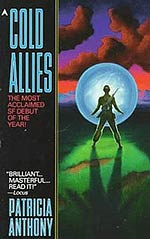
![]() charlesdee
charlesdee
11/10/2013
![]()
Patricia Anthony does not make it clear whether her 1993 novel is a near-future predictive tale or a reimagining of the world twenty years ago suffering from accelerated global warming that that has so increased the rate of desertification that the Middle East, faced with starvation, has formed an Arab National Alliance and mobilized troops for a European invasion. The European force is an uneasy coalition of Russian, Ukrainian, and other Eastern and Western European nations, with the United States as a hesitant ally their partners fear might pull out at any time. Things stateside, after all, are not going so well. The Midwestern states are deserts and what we know as our coastlines are inundated by rising ocean levels. In an extreme rehash of dustbowl migration, masses are moving west, with Colorado and the Rockies seen as a haven of cooler climes and agricultural opportunities. It is not clear how realistic this utopian vision is, but law enforcement west of Nebraska is taking the migration as a serious threat. The bulk of the migrants find themselves in miserable tent cities. Those found with "communicable diseases" are separated out, executed, and cremated.
One reason to think Anthony's world is a slight adjustment of 1993 is her fondness for cultural references that would not be out of place at that time and the lack of effort she puts into imagining how future wars might be fought. Both sides use conventional weapons, and both sides face fuel and materiel shortages. The Arab forces do not hesitate to use sarin gas both to eradicate opposition and exterminate witnesses.. The one futuristic device Anthony creates is the CRAV, a small robotic tank for both reconnaissance and attack. And then, of course, there are the aliens.
Spheres of blue light hover over battlegrounds, and although they never take an active role in the fighting, there is a sense that they favor the European allies. The Arabs find them terrifying, more like djinn than anything that might have a scientific, albeit extraterrestrial explanation. Gordon, who operates a CRAV, has his own attendant alien orb he has named Rover. They seem more curious than aggressive, although they are also almost certainly the reason some casualties are found with puncture wounds and drained of all bodily fluids.
Anthony fills this relatively compact novel with many characters from many nationalities, fighting on a variety of fronts. Her battle scenes are exciting and her vision of a decimated land is both terrifying and heartbreaking. She is not above caricature when it comes to depicting the incompetence and double-dealing of her military officers, but some comedy, even if of a bleak kind, helps you through the increasingly dire situations she recounts. Her brilliant comic creation is Mrs. Parisi, a bullshit artist of crackpot UFO "nonfiction" whose concocted theories about Eridanians are suddenly taken seriously with the appearance of the blue orbs. Parisi has a breathtaking sense of entitlement based purely on the skyrocketing sales of her ridiculous books. With the world on the brink of nuclear destruction, she is oblivious to anything that will not either get her to her next signing or help her save face before in increasingly doubtful military establishment.
Meanwhile, back with the real aliens. They are taking captive, in a generally benign manner, an assortment of citizens, soldiers, and scientists. They try to make their guests comfortable in idealized versions of the world before the current crisis, but they get details wrong. And they are not able to keep they naturally globular bodies to hold identifiable human shape for any length of time. Most disturbing are the glimpses their human guests receive of their captors' actual facial features dominated by beaks that could explain those battlefield puncture wounds.
What do these aliens want? Even those who find themselves living with them cannot be sure. They are studying our species. They are trying to understand war. It's their efforts to see to their specimen's comforts that cause the most distress. A straightforward debriefing session might make more sense, like when they ask right out about the cause of Arab aggression. "Their citizens are starving" they are told by a European commander. Next question: "Then why don't you feed them?"
http://www.potatoweather.blogspot.com